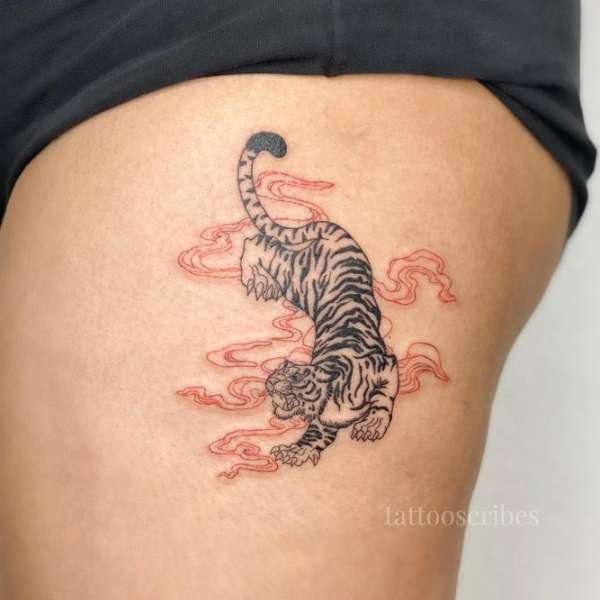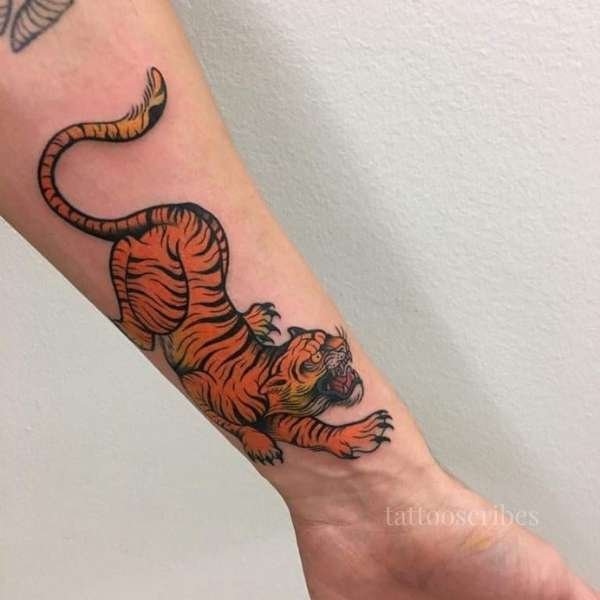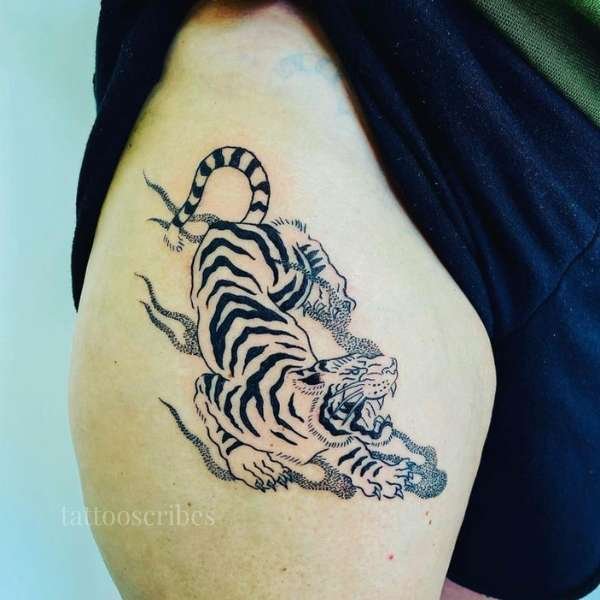A Japanese tiger tattoo is more than just a piece of art; it symbolizes strength and power. These tattoos serve as a reminder of courage and resilience.
With tattoo designs like the fierce tiger, tattoo artists capture the spirit of protection and good luck. Choosing the right Japanese tattoo can connect you to ancient cultural meanings and offer a form of self-expression.
Discover the deep tattoo symbolism and interpretation behind this mythical creature.

What Does a Japanese Tiger Tattoo Mean?
Japanese tiger tattoos represent courage, protection, and ferocity. They are often worn to showcase bravery, personal strength, and resilience against challenges. Tigers also symbolize guardianship, ensuring safety from evil spirits.
General Symbolism of Japanese Tiger Tattoos
- Strength – Embodies physical and inner power in life’s struggles.
- Courage – Reflects fearlessness and the ability to face challenges.
- Protection – Wards off evil spirits and bad luck.
- Resilience – Represents overcoming obstacles and personal growth.
- Ferocity – Highlights determination and boldness in character.

Cultural Meanings of Japanese Tiger Tattoos
- Japanese Folklore – Tigers are seen as sacred guardians in mythology.
- Samurai Symbolism – Represents bravery, honor, and martial prowess.
- Seasonal Significance – Tigers associated with wind and autumn, reflecting adaptability.
- Spiritual Protection – Believed to keep evil spirits and misfortune away.
- Yakuza Influence – In traditional tattoos, tiger motifs symbolize fearlessness and power.
You may also like below posts:

Japanese Tiger Tattoo Variations and Designs
- Realistic Tiger – Shows strength, life-like detail, and bold expression.
- Traditional Irezumi Style – Japanese-style tiger with waves, flowers, or clouds.
- Tiger and Koi Combo – Combines courage with perseverance.
- Tiger with Cherry Blossoms – Balances ferocity with beauty and fleeting life.
Find tips for selecting the right artist here.
Color Variations of Japanese Tiger Tattoo
- Orange/Yellow – Energy, vitality, and fire.
- Black/Gray – Mystery, power, and elegance.
- Blue/White – Spirituality, calm, and clarity.
Explore more aftercare advice here.

Other Symbolic Meanings of Japanese Tiger Tattoos
- Determination – Reminds wearers to stay focused on goals.
- Balance – Tigers can represent harmony between strength and grace.
- Wisdom – Symbolizes strategic thinking and intelligence.
- Freedom – Tigers roam freely, symbolizing independence and autonomy.
- Fierce Loyalty – Tigers are loyal protectors of their territory and loved ones.
Meaningful Placement Ideas
- Upper Arm/Shoulder – Shows power and visibility.
- Back – Large designs for strength and guardianship.
- Chest – Protection close to the heart.
- Leg/Thigh – Highlights agility and personal journey.
- Forearm – Displays courage and ferocity outwardly.
Frequently Asked Questions
What does a Japanese tiger tattoo symbolize?
It represents strength, courage, protection, and resilience.
Are Japanese tiger tattoos spiritual?
Yes, they are believed to ward off evil spirits and bring luck.
What colors are popular for Japanese tiger tattoos?
Orange, yellow, black, gray, blue, and white carry symbolic meanings.
Where is the best place for a Japanese tiger tattoo?
Commonly on the arm, back, chest, thigh, or forearm for visibility and meaning.
Do Japanese tiger tattoos have cultural significance?
Yes, they reflect folklore, samurai symbolism, and traditional Irezumi art.
How do different Japanese art styles influence tiger tattoo designs?
Styles like Ukiyo-e or Irezumi influence the tiger’s flow, shading, and symbolic detail—each adding unique meaning and depth.
What is the spiritual meaning behind Japanese tiger tattoos?
Spiritually, it can signify mastery over chaos and fear, acting as a guardian spirit or totem for inner strength.
Are Japanese tiger tattoos linked to any myths or legends?
Yes. Tigers appear in many folktales, often as mystical protectors or forces of nature that command fear and respect.
How should I choose the placement for a Japanese tiger tattoo?
Think about your story—back for protection, forearm for action, or chest for heart-led bravery. Placement adds symbolic weight.
What are common design elements in Japanese tiger tattoos?
You’ll often see waves, wind bars, cherry blossoms, or bamboo—each adding balance or contrast to the tiger’s fierce energy.
Wrapping It Up 🐯
Japanese tiger tattoos are more than art; they are symbols of strength, protection, and deep cultural meaning.
They make a powerful statement whether you’re drawn to their history or bold designs. Have thoughts on these majestic tattoos?
Share your insights in the comments—we’d love to hear from you! 😊
